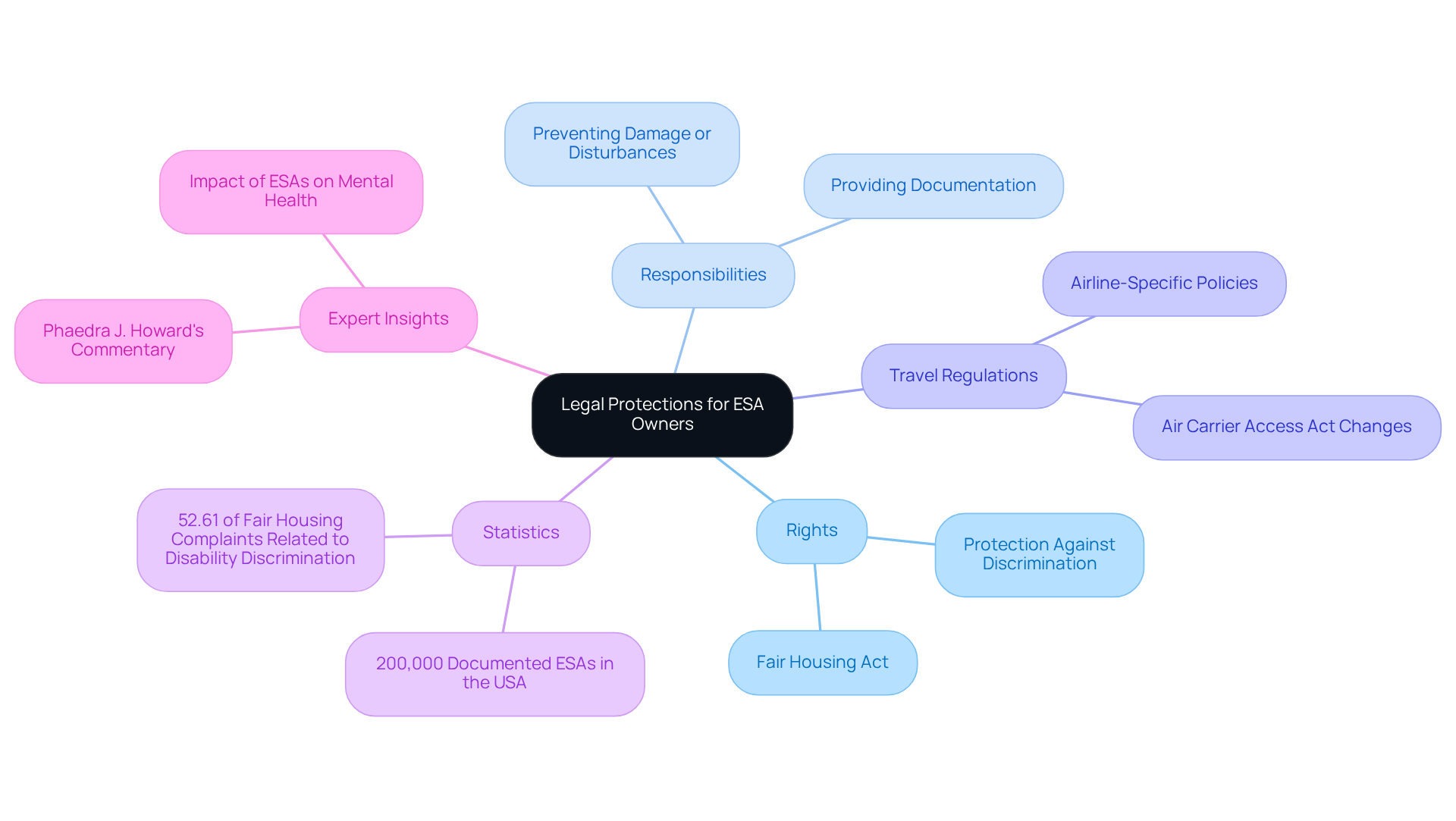

What Animals Can Be ESA: Criteria and Legal Insights
by Lena Park
Last updated: July 11, 2025
Verified and Approved by:
Angela Morris,
MSW, LCSW
Fact Checked

Overview
This article explores the criteria and legal insights regarding the classification of animals as Emotional Support Animals (ESAs). It recognizes the emotional challenges faced by individuals dealing with mental health issues, emphasizing that while dogs and cats are the most common ESAs, a variety of other domesticated animals—including rabbits, birds, and even reptiles—can qualify. These animals can provide emotional comfort and support, which is crucial for those navigating mental health difficulties. Legal frameworks, such as the Fair Housing Act, support this classification, ensuring that individuals have access to the companionship they need.
Imagine the comfort that comes from having a furry or feathered friend by your side during tough times. The presence of an ESA can significantly alleviate feelings of loneliness and anxiety, offering a sense of security and unconditional love. An ESA letter serves as a compassionate solution, validating the bond between the individual and their animal, and ensuring that this support is recognized legally.
As you reflect on your own experiences, consider how the companionship of an ESA could enhance your emotional well-being. It’s heartening to know that support is available, and that various animals can play a vital role in your journey towards healing. Remember, you are not alone in this, and there are options to help you find the comfort you deserve.
Introduction
In an era where mental health awareness is blossoming, the role of Emotional Support Animals (ESAs) has become increasingly significant. These gentle companions offer comfort and relief to individuals facing emotional challenges. However, many remain unaware of the diverse range of animals that can fulfill this vital role.
As our understanding of mental health evolves, it prompts a heartfelt question: which animals qualify as emotional support animals, and what legal protections do their owners have? This article will explore the criteria for ESAs, highlight the benefits they provide, and address the complexities of navigating the legal landscape surrounding these cherished companions.
Together, we can uncover the support that ESAs offer, helping to ease the emotional burdens many carry.
Define Emotional Support Animals: Key Characteristics and Roles
Emotional Support Creatures are gentle beings that provide comfort and assistance to individuals grappling with mental health challenges, such as anxiety, depression, or PTSD. Unlike support creatures, which are trained to perform specific tasks for individuals with disabilities, emotional support animals do not require specialized training. Their primary role is to offer companionship and help alleviate emotional distress simply through their presence. While dogs and cats are the most common types of ESAs, it’s helpful to understand what animals can be ESAs, as other domesticated creatures like rabbits, birds, and even miniature pigs can also serve in this nurturing capacity. The essence of an ESA lies in its ability to provide emotional support, significantly enhancing the owner’s quality of life.
Many dog breeds can be trained as service dogs, but certain breeds are often chosen for their unique traits and characteristics that make them particularly suited for this important work. Breeds such as:
- Labrador Retrievers
- Golden Retrievers
- German Shepherds
- Poodles
are frequently selected for their intelligence, trainability, and temperament. It’s essential to understand that emotional assistance creatures differ from service dogs in terms of legal rights and access. While ESAs offer emotional comfort and support, they do not have the same legal rights to access public spaces as service dogs do under the ADA.
Clients have shared their positive experiences with obtaining an ESA letter through Wellness Wag, highlighting the exceptional support they received. As Linda S. expressed, “Applying for an ESA through Wellness Wag was the best decision I made. It was an effortless process and the team was very professional.” This testimonial reflects the streamlined online platform that Wellness Wag offers, ensuring a quick and efficient application process for those seeking emotional support through their beloved pets.
If you find yourself facing emotional challenges, consider how an ESA could bring comfort and companionship into your life. Remember, you are not alone, and there is support available to help you on your journey toward emotional well-being.
Identify Eligible Animals: Criteria for Emotional Support Animals
To qualify as an Emotional Support Animal (ESA), the creature must be domesticated and provide comfort to its owner. Many individuals face emotional challenges, and having a companion can make a significant difference. While dogs and cats are the most common emotional support animals, knowing what animals can be ESA includes a variety of other beings, such as:
- rabbits
- guinea pigs
- birds
- even reptiles
The essential criterion is that the creature must assist in alleviating symptoms of a mental health condition, which can range from anxiety to depression.
It’s important to note that there are no specific training prerequisites for emotional support animals; however, the pet should be well-mannered and not pose a risk to others. The owner must demonstrate a valid necessity for the ESA, typically supported by a letter from a licensed mental health expert detailing the emotional assistance the creature offers. In 2025, the diversity of ESAs continues to expand, reflecting a broader understanding of the therapeutic advantages that different animals can provide.
Around 18% of pet owners in the U.S. indicate having an ESA, with dogs and cats remaining the most favored. Yet, a growing number of individuals are recognizing what animals can be ESA, as they provide emotional support. Have you considered how a different type of pet might bring you comfort? To streamline the process of obtaining a legitimate ESA letter, individuals can contact Wellness Wag for assistance.
Furthermore, it is essential to recognize that an ESA letter requires annual renewal to maintain its validity, ensuring continuous support for those in need. As Jonalyn Dionio stated, “Emotional support animals assist with conditions like anxiety, depression, and post-traumatic stress disorder,” highlighting their critical role in mental health care. Remember, you are not alone in your journey; support is available, and an ESA might just be the companion you need.
Understand Legal Protections: Rights and Responsibilities of ESA Owners
Emotional support animals, which fall under the category of what animals can be esa, are protected under the Fair Housing Act (FHA), allowing individuals with disabilities to seek reasonable adjustments for their support companions, even in places with pet limitations. This legal framework is crucial, as it ensures that landlords cannot deny tenants the right to have an ESA, provided they present the necessary documentation. However, it’s important for ESA owners to recognize their responsibility in ensuring their companions do not cause damage or disturbances, as landlords may hold them accountable for any issues that arise.
In recent years, significant changes have emerged regarding ESA travel regulations. While emotional support creatures were once welcomed on airplanes, many airlines have updated their policies, no longer recognizing them as service entities. This shift emphasizes the need for ESA owners to stay informed about the specific laws and regulations that affect their circumstances, helping them to ensure compliance and protect their rights. Did you know that approximately 200,000 documented Emotional Support Animals (ESAs) are examples of what animals can be esa in the USA? Yet, disability discrimination accounted for 52.61% of fair housing complaints in 2023, highlighting the ongoing challenges ESA owners face in securing their rights. As Phaedra J. Howard, a partner specializing in community association law, wisely noted, “Landlords should explore accommodations for animals before denying requests based on safety concerns.” Understanding these legal protections and responsibilities is essential for ESA owners navigating the complexities of housing and travel challenges.

Conclusion
Emotional Support Animals (ESAs) are truly invaluable companions for individuals navigating the complexities of mental health challenges. It’s important to recognize that the criteria for classifying animals as ESAs extend beyond just dogs and cats; a variety of domesticated creatures, such as rabbits and birds, can provide essential comfort and companionship. These animals can profoundly enhance the emotional well-being of their owners, illustrating that support can manifest in many delightful forms.
In this article, we’ve explored the characteristics of ESAs, the legal protections available to their owners, and the responsibilities that accompany having such loving companions. While ESAs do not require specialized training like service animals, their role in alleviating symptoms of mental health conditions is significant. The evolving legal landscape emphasizes the need for ESA owners to understand their rights and responsibilities, particularly in terms of housing and travel.
The journey toward emotional well-being can be profoundly enriched by the presence of an ESA. As awareness increases regarding the diverse animals that can fulfill this role, we encourage individuals to reflect on how these companions might positively impact their lives. Embracing the therapeutic benefits of ESAs not only fosters personal healing but also nurtures a broader understanding of the essential role these animals play in mental health care. Remember, you are not alone in this journey; the support of an ESA can be a gentle guiding light towards a brighter, more hopeful future.
Frequently Asked Questions
What are Emotional Support Animals (ESAs)?
Emotional Support Animals are gentle beings that provide comfort and assistance to individuals dealing with mental health challenges, such as anxiety, depression, or PTSD. Their primary role is to offer companionship and help alleviate emotional distress through their presence.
Do Emotional Support Animals require specialized training?
No, Emotional Support Animals do not require specialized training. Unlike service animals, which are trained to perform specific tasks for individuals with disabilities, ESAs provide emotional support simply by being with their owners.
What types of animals can be considered ESAs?
While dogs and cats are the most common types of ESAs, other domesticated animals such as rabbits, birds, and even miniature pigs can also serve in this nurturing capacity.
How do ESAs differ from service dogs?
ESAs differ from service dogs in terms of legal rights and access. While ESAs offer emotional comfort and support, they do not have the same legal rights to access public spaces as service dogs do under the Americans with Disabilities Act (ADA).
What breeds are commonly chosen as service dogs?
Commonly chosen breeds for service dogs include Labrador Retrievers, Golden Retrievers, German Shepherds, and Poodles, due to their intelligence, trainability, and temperament.
How can one obtain an ESA letter?
Clients have reported positive experiences with obtaining an ESA letter through Wellness Wag, which offers a streamlined online platform for a quick and efficient application process.
What do clients say about the application process for an ESA through Wellness Wag?
Clients have shared that the application process through Wellness Wag is effortless and professional. For example, one client, Linda S., stated, “Applying for an ESA through Wellness Wag was the best decision I made.”
How can an ESA help individuals facing emotional challenges?
An ESA can bring comfort and companionship into the lives of individuals facing emotional challenges, providing support and enhancing their quality of life.
Certify Your Emotional Support Animal Today

Why You Can Rely on Us?
At Wellness Wag, we believe your pet deserves care rooted in both science and compassion. Each article is carefully researched, written in clear language for pet owners, and then reviewed by qualified professionals to ensure the information is evidence-based, current, and practical for real-life care. Our goal is to help you feel confident in making informed decisions about your pet’s health and well-being.
Reviewed by
Angela Morris, MSW, LCSW
Angela is a licensed clinical social worker with 20 years of experience in patient advocacy and community mental health. She has assisted numerous clients with ESA evaluations and brings a deep understanding of disability accommodations, ensuring that all information is accurate, supportive, and practical.

Written by :
Lena Park
Last Updated :
July 11, 2025












